Two Orphan Vampires Blu-ray Movie
HomeTwo Orphan Vampires Blu-ray Movie 
Les deux orphelines vampiresRedemption | 1997 | 103 min | Unrated | Aug 28, 2012
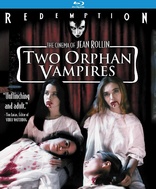
Price
List price:Amazon: $21.48 (Save 14%)
Third party: $21.48 (Save 14%)
Only 5 left in stock (more on the way).
Movie rating
6.3 | / 10 |
Blu-ray rating
| Users | 0.0 | |
| Reviewer | 2.5 | |
| Overall | 2.5 |
Overview
Two Orphan Vampires (1997)
The film is the story of two teenage girls, Louise and Henriette, who have grown up orphaned and are believed to be blind. While it is true that they cannot see during the day, Louise and Henriette are given the power of vision at night, when they hunt their prey.
Starring: Alexandra Pic, Isabelle Teboul, Natalie Perrey, Gudule, Bernard CharnacéDirector: Jean Rollin
| Horror | Uncertain |
| Foreign | Uncertain |
| Erotic | Uncertain |
Specifications
Video
Video codec: MPEG-4 AVC
Video resolution: 1080p
Aspect ratio: 1.69:1
Original aspect ratio: 1.85:1
Audio
French: LPCM 2.0
English: LPCM 2.0
Subtitles
English
Discs
25GB Blu-ray Disc
Single disc (1 BD)
Playback
Region A, B (C untested)
Review
Rating summary
| Movie | 2.0 | |
| Video | 3.0 | |
| Audio | 3.5 | |
| Extras | 3.5 | |
| Overall | 2.5 |
Two Orphan Vampires Blu-ray Movie Review
Rollin's return to the vamp genre.
Reviewed by Casey Broadwater August 29, 2012Between 1968 and 1979, French cult filmmaker Jean Rollin made six films about vampires or blood fetishists—The Rape of the Vampire,
The Nude Vampire, The Shiver of the Vampires, Requiem for a Vampire, and Fascination—establishing several
directorial calling cards along the way. Settling in to watch any given Rollin movie, you can justifiably expect to see mouldering graveyards, abandoned
chateaus, gratuitous nudity, and—most frequently—a pair of young, codependent female characters, either sisters or lovers. It'd be a stretch to claim
Rollin spent most of his career essentially remaking the same film with slight variations, but not much of one.
By the early 1980s, his dreamy, gothic brand of le fantastique had fallen out of fashion—the rise of the slasher film had killed audiences'
attention spans—and Rollin turned to directing porno under a pseudonym to make ends meet, occasionally scraping together the money to make
another feature. When the funds began drying up entirely, he transitioned to writing fiction, publishing a series of novellas known collectively as
Les Deux Orphelines Vampires, a supernatural riff on Les Deux Orphelines, an 1875 novel about two orphan girls adrift in Paris during
the French Revolution. Cult appreciation moves in cycles, and by the 1990s, interest in Rollin's early films peaked, allowing him to secure a budget for a
new movie that—as he was recently diagnosed with kidney failure—he assumed would be his last. Released in 1997, Two Orphan Vampires
does have an air of finality, as if Rollin—who subsequently got a transplant and lived until 2010—was revisiting and bidding adieu to all his favorite
themes. Unfortunately, this also means it feels like more of the same, a rote regurgitation of images and ideas he'd used to better effect twenty years
before.
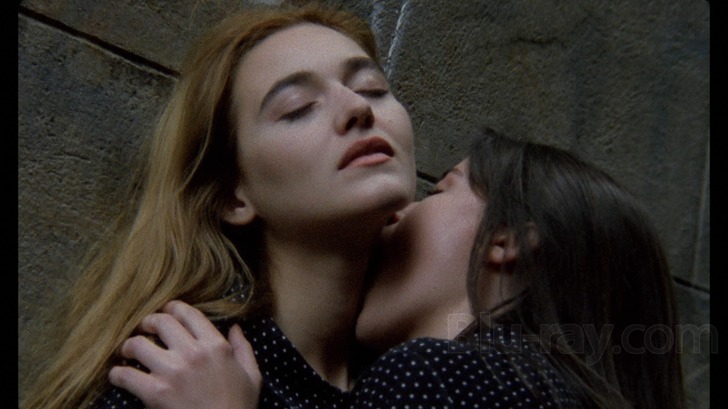
The orphan vamps of the title, blonde Henriette and brunette Louise—played by overacting newcomers Isabelle Teboul and Alexandra Pic—are teenaged wards of the Glycine Orphanage, under the care of two kindly nuns, Sister Marthe (Natalie Perrey) and Mother Superior (Anne Duguël), who refer to them as "our little blind angels." In an interesting spin on the usual vampire mythos, Henriette and Louise, rather than burning up in the sun, are instead sightless during the day, holding hands and walking side-by-side with their white canes outstretched. At night, however, their vision returns and they can see the world "in blue," which I suspect was Rollin's way of narratively explaining the budgetary restriction of having to shoot all the nighttime scenes during the day with a heavy blue filter.
Innocent darlings during normal waking hours, the two girls are blood-hungry vamps after dark, sneaking out of the orphanage to bum around a nearby cemetery—which they call their "real home"—and sucking the life out of a poor dog that happens to be trotting through. It's also here that they sit to reminisce about their past lives, both believing that their souls are intertwined, that they're perpetually reincarnated together, and that they were originally Mayan goddesses. (Or Aztec, or Incan; the film goofily uses the three interchangeably). In one flashback, the girls murder a painter on the Brooklyn Bridge and later, after a "mishap" that's not shown on screen—presumably they were discovered as vampires—we watch as they die side by side, splayed out and bloody on a wooden floor.
Adopted by the "respected eye specialist" Dr. Jennery (Bernard Charnacé)—who hopes to cure them one day, and who, for a Rollin film, has surprisingly pure intentions regarding his hot young charges—the girls are moved to Paris, where they continue their nocturnal prowling, hitting the streets after their new dad goes to bed. For a stretch, the film plays out in a series of episodic misadventures, with Henriette and Louise taking new victims, running away from pursuers, and encountering other supernatural creatures of the dark, including a dirt-chucking ghoul (Tina Aumont) and the "Midnight Lady," a vamp with bat wings who allows our heroines to sleep in her coffin. But they're not heroines for long. When the blood-sisters begin plotting the demise of their père adoptif—who has discovered their secret and now knows too much—they lose our sympathy and what innocence they had left.
Although there are a few gratuitously topless moments, the film lacks Rollin's signature eroticism. That said, this might be counted as a small victory for the director, since the rampant nudity of his earlier pictures was usually mandated by meddling producers hoping to broaden the target audiences of these otherwise bleak, non-salacious stories. The movie isn't nearly as gory as you'd think either, especially compared to this week's other Rollin release, The Living Dead Girl. The relative freedom he seemingly had here is both a blessing and a curse—the former because he finally got to make a film his way, and the latter because his way is actually kind of dull.
Like many of Jean Rollin's movies, Two Orphan Vampires has conceptual potential—I like the idea of forever reincarnated vamps doomed to die and rise again—but it's marred by technical ineptitude, pacing/structural issues, and the amateurism of its unknown actors. (Of course, many Euro- horror fans enjoy these films for their low-budget flaws, but that's another matter entirely.) Here, Rollin does precisely one thing right—atmosphere. His films are practically humid with a hazy melancholic mood, and this one is no different, particularly when the two orphan bloodsuckers wax poetic over their imagined past lives and speculate on arcane and paradoxical philosophical matters, like the idea that "all gods are real because they are imaginary." There's not much substance to these ramblings, which superficially rehash many of Rollin's old themes—paganism vs. Christianity, sisterly love, the thin boundaries between life and death, dream and reality—but they at least give the film the illusion of depth.
Two Orphan Vampires Blu-ray Movie, Video Quality 
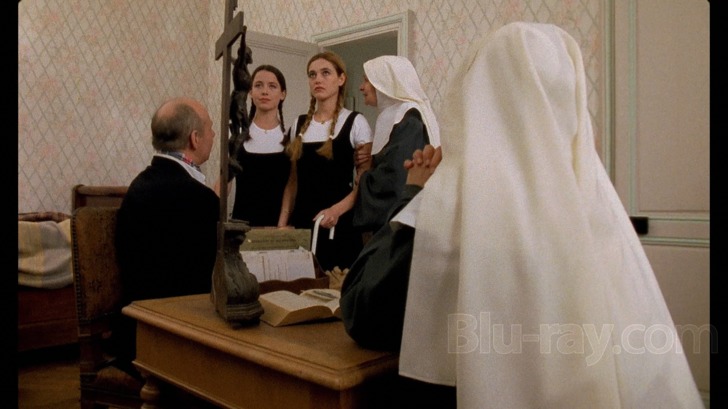
Unlike most of Jean Rollin's films, the low-budgeted Two Orphan Vampires was shot on 16mm—instead of 35mm—so it inherently has a softer, chunkier look. What might come as more of a surprise is that this film, though made in 1997, has more print damage—in the form of near constant white specks, occasional scratches, and hairs stuck in the gate—than most of the Rollin movies from the '60s and '70s that Kino has released. That said, if you've ever seen the fairly atrocious Two Orphan Vampires DVD, which was released by Media Blasters in 2002, Kino's new 1080p/AVC- encoded transfer—sourced from the original 16mm negative—is a revelation. The film is unavoidably soft, but the high definition remaster brings out more detail, especially in closeups, and more naturally filmic texture. As usual with Kino releases, there's been no DNR or edge enhancement, but no digital restorative clean-up either. Essentially, the film is presented "as is." Color-wise, the film frequently employs a heavy, hazy day-for-night blue filtering that's very unnatural looking, but it's explained away in the script when one of the twins refers to "seeing blue." During the daytime scenes, however, color seems balanced and adequately dense, with a tonal contrast curve that has deep-enough blacks and highlights that are never overblown. Overall, the Blu-ray re-release makes for an impressive upgrade from the DVD, but this is far from Rollin's best-looking film.
Two Orphan Vampires Blu-ray Movie, Audio Quality 
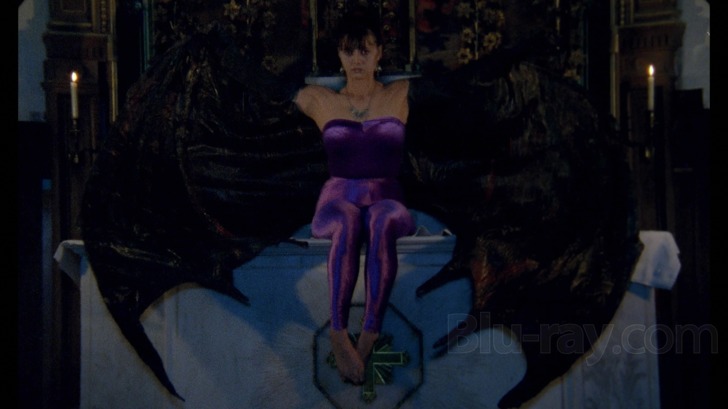
Kino has given us two audio options here, the original French and an unsurprisingly goofy English dub, both presented in uncompressed Linear PCM 2.0 stereo. Aside from the language differences—and you'll want to stick with the French if at all possible, as the English dub is overlaid a bit too obviously on the mix—the two tracks seem fairly similar in tone, clarity, and dynamics. This isn't exactly a rock 'em, sock 'em audio presentation, but it gets the job done, with clear, comprehensible dialogue, a modicum of stereo separation, and a nice reproduction of Philippe D'Aram's score, which features lots of breathy synthesizer tones. The disc includes optional English subtitles, which appear in easy-to-read white lettering.
Two Orphan Vampires Blu-ray Movie, Special Features and Extras 

- Memories of a Blue World (1080p, 42:30): A comprehensive documentary by Daniel Gouyette about the making of Two Orphan Vampires, featuring interviews with the cast and crew. Arguably the best supplement on one of these Jean Rollin releases thus far!
- Interview with Jean Rollin (SD, 20:19): A 2008 interview with Rollin that covers the entire breadth of his career.
- Jean Rollin Trailers: Includes high definition trailers for all the Jean Rollin Blu-ray releases.
- Booklet: Inside the case you'll find a 12-page booklet with an essay by Tim Lucas, editor of Video Watchdog.
Two Orphan Vampires Blu-ray Movie, Overall Score and Recommendation 
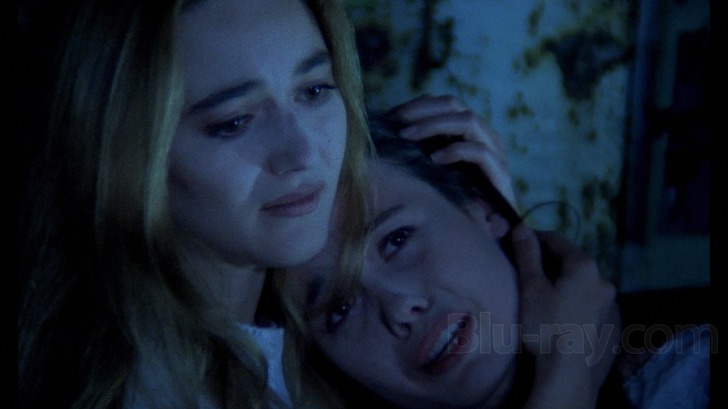
Jean Rollin's return to the bloodsucker genre and one of his final films, Two Orphan Vampires unfortunately isn't quite as compelling as some of his earlier movies. All of the Rollin-esque elements are here—the codependent female leads, the overgrown graveyards, the kooky characters and theatrical dialogue—but they really only serve to show how little the director evolved/progressed as a filmmaker throughout his career. Two Orphan Vampires has a distinct we've seen this all before vibe, and it's really only a must-watch for the steeliest Rollin fans. Euro-cult enthusiasts should be pleased, however, with Kino's new high definition remaster of the 16mm film, which is a huge improvement over the 2002 DVD.
Other editions
Two Orphan Vampires: Other Editions

Two Orphan Vampires
Les deux orphelines vampires | Indicator Series | Limited Edition
1997

Two Orphan Vampires 4K
Les deux orphelines vampires | Indicator Series | Limited Edition
1997

Two Orphan Vampires 4K
Les deux orphelines vampires | Indicator Series | Standard Edition
1997
Similar titles
Similar titles you might also like

The Demoniacs 4K
Les démoniaques | Limited Edition | Indicator Series
1974

Fascination 4K
Standard Edition | Indicator Series
1979

The Nude Vampire 4K
La vampire nue | Limited Edition | Indicator Series
1970

The Shiver of the Vampires 4K
Le frisson des vampires / Strange Things Happen at Night | Indicator Series | Standard Edition
1971

The Night of the Hunted 4K
La nuit des traquées | Indicator Series | Standard Edition
1980

Lips of Blood
Lèvres de sang | Limited Edition | Indicator Series
1975

The Rape of the Vampire 4K
Le viol du vampire | Indicator Series | Limited Edition
1968

Dracula's Fiancée
La fiancée de Dracula
2002

Requiem for a Vampire 4K
Caged Virgins | Vierges et vampires | Limited Edition
1971-1973

The Iron Rose 4K
La rose de fer
1973

Vampyros Lesbos
Special 2-Disc Limited Edition
1971

Daughter of Dracula
La fille de Dracula
1972

Lake of Dracula
Noroi no yakata: Chi o suu me
1971

The Vampire Doll
Chi o suu ningyô
1970

Devil's Kiss
La perversa caricia de Satán
1976

The Werewolf Versus the Vampire Woman 4K
Limited Edition | La noche de Walpurgis / Werewolf Shadow / Werewolf and the Vampire Woman / Werewolf vs. the Vampire Woman | Slipcover in Original Pressing
1971

Black Sunday 4K
The Mask of Satan / La maschera del demonio 4K
1960

Black Sabbath
AIP Cut | 60th Anniversary
1963

Count Dracula's Great Love
El gran amor del conde Drácula / Cemetery Girls / Dracula's Virgin Lovers / The Great Love of Count Dracula
1973

The Blood Spattered Bride
La novia ensangrentada
1972